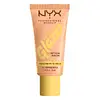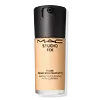NYX Cosmetics Buttermelt Glaze Soft Glow Skin Tint SPF 30 Versus Mac Cosmetics Studio Fix Fluid SPF 15 24HR Matte Foundation + Oil Control
What's inside
What's inside
 Key Ingredients
Key Ingredients

 Benefits
Benefits

 Concerns
Concerns

 Ingredients Side-by-side
Ingredients Side-by-side

Water
Skin ConditioningGlycerin
HumectantCaprylyl Methicone
Skin ConditioningDimethicone
EmollientSilica
AbrasiveButyloctyl Salicylate
Skin ConditioningCetyl PEG/PPG-10/1 Dimethicone
EmulsifyingNiacinamide
SmoothingPropanediol
SolventDimethicone/PEG-10/15 Crosspolymer
Camellia Sinensis Leaf Extract
AntimicrobialMangifera Indica Seed Butter
Skin ConditioningButyrospermum Parkii Butter
Skin ConditioningSimethicone
EmollientSodium Chloride
MaskingSodium Citrate
BufferingSodium Hyaluronate
HumectantSilica Silylate
EmollientTrimethylsiloxysilicate
EmollientAluminum Hydroxide
EmollientAdenosine
Skin ConditioningDisodium Stearoyl Glutamate
CleansingDipropylene Glycol
HumectantCaprylyl Glycol
EmollientCitric Acid
BufferingTrisodium Ethylenediamine Disuccinate
Maltodextrin
AbsorbentSynthetic Fluorphlogopite
Disteardimonium Hectorite
StabilisingTocopherol
AntioxidantPentaerythrityl Tetra-Di-T-Butyl Hydroxyhydrocinnamate
AntioxidantPhenoxyethanol
PreservativeChlorphenesin
AntimicrobialParfum
MaskingLimonene
PerfumingTitanium Dioxide
Cosmetic ColorantIron Oxides
Water, Glycerin, Caprylyl Methicone, Dimethicone, Silica, Butyloctyl Salicylate, Cetyl PEG/PPG-10/1 Dimethicone, Niacinamide, Propanediol, Dimethicone/PEG-10/15 Crosspolymer, Camellia Sinensis Leaf Extract, Mangifera Indica Seed Butter, Butyrospermum Parkii Butter, Simethicone, Sodium Chloride, Sodium Citrate, Sodium Hyaluronate, Silica Silylate, Trimethylsiloxysilicate, Aluminum Hydroxide, Adenosine, Disodium Stearoyl Glutamate, Dipropylene Glycol, Caprylyl Glycol, Citric Acid, Trisodium Ethylenediamine Disuccinate, Maltodextrin, Synthetic Fluorphlogopite, Disteardimonium Hectorite, Tocopherol, Pentaerythrityl Tetra-Di-T-Butyl Hydroxyhydrocinnamate, Phenoxyethanol, Chlorphenesin, Parfum, Limonene, Titanium Dioxide, Iron Oxides
Water
Skin ConditioningMethyl Trimethicone
Skin ConditioningDimethicone
EmollientTrimethylsiloxysilicate
EmollientPEG-10 Dimethicone
Skin ConditioningButylene Glycol
HumectantIsododecane
EmollientPolyethylene
AbrasiveCetyl PEG/PPG-10/1 Dimethicone
EmulsifyingMagnesium Sulfate
Algae Extract
EmollientLaminaria Saccharina Extract
Skin ProtectingSodium Hyaluronate
HumectantSalix Nigra Bark Extract
Skin ProtectingTocopheryl Acetate
AntioxidantCaffeine
Skin ConditioningLecithin
EmollientHydrogenated Lecithin
EmulsifyingDisteardimonium Hectorite
StabilisingSilica
AbrasiveXanthan Gum
EmulsifyingDimethicone Crosspolymer
Emulsion StabilisingTriethoxycaprylylsilane
Dimethicone/PEG-10/15 Crosspolymer
Methoxy Amodimethicone/Silsesquioxane Copolymer
Skin ConditioningSorbitan Sesquioleate
EmulsifyingSalicylic Acid
MaskingSodium Citrate
BufferingLaureth-7
EmulsifyingMethyldihydrojasmonate
MaskingPropylene Carbonate
SolventAlumina
AbrasiveDipropylene Glycol
HumectantPentaerythrityl Tetra-Di-T-Butyl Hydroxyhydrocinnamate
AntioxidantBHT
AntioxidantPhenoxyethanol
PreservativeSorbic Acid
PreservativeChloroxylenol
AntimicrobialCI 77891
Cosmetic ColorantCI 77491
Cosmetic ColorantCI 77492
Cosmetic ColorantCI 77499
Cosmetic ColorantWater, Methyl Trimethicone, Dimethicone, Trimethylsiloxysilicate, PEG-10 Dimethicone, Butylene Glycol, Isododecane, Polyethylene, Cetyl PEG/PPG-10/1 Dimethicone, Magnesium Sulfate, Algae Extract, Laminaria Saccharina Extract, Sodium Hyaluronate, Salix Nigra Bark Extract, Tocopheryl Acetate, Caffeine, Lecithin, Hydrogenated Lecithin, Disteardimonium Hectorite, Silica, Xanthan Gum, Dimethicone Crosspolymer, Triethoxycaprylylsilane, Dimethicone/PEG-10/15 Crosspolymer, Methoxy Amodimethicone/Silsesquioxane Copolymer, Sorbitan Sesquioleate, Salicylic Acid, Sodium Citrate, Laureth-7, Methyldihydrojasmonate, Propylene Carbonate, Alumina, Dipropylene Glycol, Pentaerythrityl Tetra-Di-T-Butyl Hydroxyhydrocinnamate, BHT, Phenoxyethanol, Sorbic Acid, Chloroxylenol, CI 77891, CI 77491, CI 77492, CI 77499
 Reviews
Reviews

Ingredients Explained
These ingredients are found in both products.
Ingredients higher up in an ingredient list are typically present in a larger amount.
This ingredient is a high molecular weight silicone. It has emulsifying and skin conditioning properties.
Dimethicone is a type of synthetic silicone created from natural materials such as quartz.
What it does:
Dimethicone comes in different viscosities:
Depending on the viscosity, dimethicone has different properties.
Ingredients lists don't always show which type is used, so we recommend reaching out to the brand if you have questions about the viscosity.
This ingredient is unlikely to cause irritation because it does not get absorbed into skin. However, people with silicone allergies should be careful about using this ingredient.
Note: Dimethicone may contribute to pilling. This is because it is not oil or water soluble, so pilling may occur when layered with products. When mixed with heavy oils in a formula, the outcome is also quite greasy.
Learn more about DimethiconeDimethicone/PEG-10/15 Crosspolymer is a type of silicone.
Dipropylene Glycol is a synthetically created humectant, stabilizer, and solvent.
This ingredient helps:
Dipropylene glycol is technically an alcohol, but it belongs to the glycol family (often considered part of the ‘good’ alcohols). This means it is hydrating and gentle on skin unlike drying solvent alcohols like denatured alcohol.
As a masking agent, Dipropylene Glycol can be used to cover the smell of other ingredients. However, it does not have a scent.
Studies show Dipropylene Glycol is considered safe to use in skincare.
Learn more about Dipropylene GlycolDisteardimonium Hectorite comes from the clay mineral named hectorite. It is used to add thickness to a product.
It can also help stabilize a product by helping to disperse other ingredients.
Hectorite is a rare, white clay mineral.
Learn more about Disteardimonium HectoritePentaerythrityl Tetra-Di-T-Butyl Hydroxyhydrocinnamate (long name, huh?) is a synthetic antioxidant.
It is used to help stabilize other antioxidants or prevent the color from changing in a product.
As an antioxidant, it helps fight free-radical molecules. Free-radical molecules are capable of damaging our cells and other genetic material. Thus, antioxidants may reduce the signs of aging.
This ingredient is oil-soluble.
Learn more about Pentaerythrityl Tetra-Di-T-Butyl HydroxyhydrocinnamatePhenoxyethanol is a preservative that has germicide, antimicrobial, and aromatic properties. Studies show that phenoxyethanol can prevent microbial growth. By itself, it has a scent that is similar to that of a rose.
It's often used in formulations along with Caprylyl Glycol to preserve the shelf life of products.
Silica, also known as silicon dioxide, is a naturally occurring mineral. It is used as a fine, spherical, and porous powder in cosmetics.
Though it has exfoliant properties, the function of silica varies depending on the product.
The unique structure of silica enhances the spreadability and adds smoothness, making it a great texture enhancer.
It is also used as an active carrier, emulsifier, and mattifier due to its ability to absorb excess oil.
In some products, tiny microneedles called spicules are made from silica or hydrolyzed sponge. When you rub them in, they lightly polish away dead skin layers and enhance the penetration of active ingredients.
Learn more about SilicaSodium Citrate is the sodium salts of citric acid. In skincare, it is used to alter pH levels and acts as a preservative.
Its main functions are to maintain the pH of a product and neutralize metal ions.
The acidity of our skin is maintained by our glands and skin biome; normal pH level of skin is slightly acidic (~4.75-5.5).
Being slightly acidic allows our skin to create an "acid mantle". This acid mantle is a thin barrier that protects our skin from bacteria and contaminants.
Learn more about Sodium CitrateSodium Hyaluronate is hyaluronic acid's salt form. It is commonly derived from the sodium salt of hyaluronic acid.
Like hyaluronic acid, it is great at holding water and acts as a humectant. This makes it a great skin hydrating ingredient.
Sodium Hyaluronate is naturally occurring in our bodies and is mostly found in eye fluid and joints.
These are some other common types of Hyaluronic Acid:
Learn more about Sodium HyaluronateThis silicone is an emollient. Emollients create a thin film on the skin to prevent moisture from escaping.
It is not soluble in water and helps increase water-resistance in products.
According to a manufacturer, it can blend seamlessly with silicone oils, such as Cyclopentasiloxane.
Learn more about TrimethylsiloxysilicateWater. It's the most common cosmetic ingredient of all. You'll usually see it at the top of ingredient lists, meaning that it makes up the largest part of the product.
So why is it so popular? Water most often acts as a solvent - this means that it helps dissolve other ingredients into the formulation.
You'll also recognize water as that liquid we all need to stay alive. If you see this, drink a glass of water. Stay hydrated!
Learn more about Water